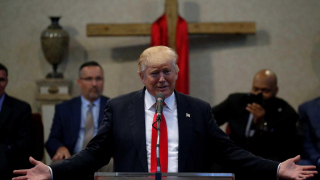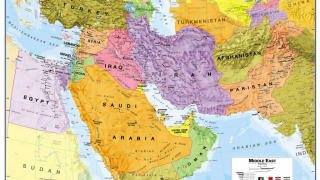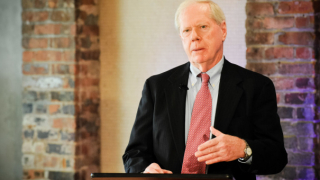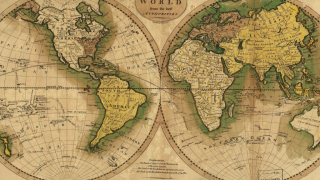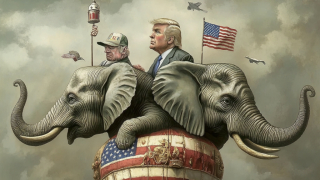The U.S. and the Current Brazilian Diplomacy
“All wars represent a failure of diplomacy.”
Tony Benn
There is no vacuum of power. In geopolitics, there is no inertia. But, in Brazil, we defy logic and the conventional functioning of things: The actual administration is taking an increasingly passive role in the country, creating an immense conceptual void, a systematic destruction of previously built structures.
The current tension between Brazil and Venezuela boosts the constant questioning about the possibility of our engagement in a de facto military action. But, while we embarrass ourselves with the chance of a literal war, it’s necessary to recognize that our political atmosphere is already an unfriendly, warlike one. We are already breathing warmongering breezes.
In an extremely unstable environment like Brazil, our foreign policy is one of the few solid constitutions that we have. Our (relatively) long diplomatic tradition, initiated by José Maria da Silva Paranhos Júnior (better known simply as Barão do Rio Branco), is one of the most consolidated state programs and one of the pillars that could survive the typical discontinuity and the various oscillations of our domestic political issues. This solidity is liquefying itself through the diplomatic line adopted in this "new" government.
With promises of a complete rupture with “ideological” elements and with both inflamed and trivial speeches about a new government strictly guided by pragmatic questions and “technical” and functional personnel, the truth is that we can perceive a deepening of ideologisms on Brazilian politics — not only because ideology is an inescapable element of the human life, but also because the members of the actual government are totally distanced from the real questions, making a covenant with a prefabricated agenda — and, of course, an imported one.
This agenda is in line with the olavismo (olavism, in a free translation), a neologism that I (and many others) use to describe the set of ideas compiled by Olavo de Carvalho, the self-proclaimed Brazilian philosopher who now resides in Richmond, Virginia, whose main activity is the reproduction and transmission of American neocon[1] thought to the Brazilian public. In order to gain residency in the United States, he even received a Green Card “for foreigners with extraordinary abilities” from the US government, initiating Olavo's long "conceptual" work to defend the US as a nation, as a power, in its actions and in its geopolitical interests.
In addition to the US political-cultural advocacy, Olavo's "philosophical" activity consists of reproducing all US conspiracy theories in Brazil, including anti-vaccination sentiment and the spread of anti-scientific distortions—such as, for example, his inveterate defense of smoking tobacco as something beneficial to health and useful for the prevention of Alzheimer's.
Olavo inspires the most schizophrenic, ideologically compromised, and inept faction of the Bolsonaro government. The actions of Ernesto, with the External Relations Ministry, and Vélez Rodríguez in Education speak for themselves. Recently, Olavo himself publicly summoned his followers and students who today make up the government to abandon their governmental positions.
The olavist sector is essentially opposed to the group formed by the military forces—he himself has already confronted the vice president, General Amilton Mourão. Fundamentally, through Eduardo Bolsonaro (and other figures), Olavo pressures to drive away or to attempt to limit the power of action of the uniformed government’s men.
The very inconsistency of Olavo’s faction, nevertheless, creates the necessary arenaceous consistency to avoid the materialization of this segment’s political projects. This means both interference within Olavo's own core and fission within a government that is already effectively divided between mutually opposed and inconsistent sectors. The greatest antagonism to the Bolsonaro government is the agents that compose it, not external elements.
Ernesto Araújo, currently the Minister of Foreign Affairs, is himself one of his students, directly appointed by his tutor for the position that he currently occupies. In a way, therefore, the inspiration for Brazil's diplomatic actions is no longer produced in the Itamaraty, but rather in Virginia.
The (almost, yet) complete Brazilian government submission and subservience to the United States is the core element of this agenda that induces Brazilian politics at two subjection levels: in relation to the USA and in relation to Olavo. The decisions taken by Ernesto are extensions and performances of the agenda defended by Olavo de Carvalho and, more than this, of the American neoconservatism, much bigger than the olavism that, in the last instance, is a “mere” translation and transmission of this political thought to Brazil.
Throughout almost the entire history of Brazil, our foreign policy has kept a pragmatic and realistic notion, creating multiple relationships, avoiding tensions and even promoting conflict mediation. No more: The incursions of Eduardo Bolsonaro (the deputy who assumed for himself the role of diplomat) in his travels serve to create new fronts, new trenches to a diplomatic war without precedents.
At a meeting promoted by the Trumpettes USA group at the luxurious Mar-a-Lago resort in Palm Beach, Eduardo praised Trump's project for building a new wall on the Mexican border and managed to create enmity where it had never existed.
He also had a meeting with Steve Bannon that, alongside Olavo, is one of the heads of this bolsonarism’sascension process (Bannon had many meetings with Eduardo Bolsonaro prior, during, and after the Brazilian 2018 presidential elections). And, in a larger scope, Bannon is one of the strategists behind the triumph of many groups aligned with this Right-wing/Extreme Right-wing populist formulation in many other countries, mainly in Western Europe and, now, in the Americas.
In the outline of a pyramid, we can put Bannon on top, followed by Trump and, just below, we have Olavo above Bolsonaro. Olavo is a repeater of Bannon's politology, disseminating the submission of bolsonarism to trumpism. This external ideological dependence reaches unprecedented levels. Even during the period of the Brazilian military dictatorship, from 1964 to 1985, with a recognized political alignment to the US, Brazilian foreign relations followed an essentially independent path.
We can mention a very illustrative example to testify this affirmation: On November 11, 1975, amidst a military regime, Brazil recognized the independence of Angola, the result of a process led by the Popular Movement for the Liberation of Angola (MPLA), which was then a Marxist-Leninist oriented group. Even during this period, our diplomats made a rapprochement with the then Soviet Union and also with China—in addition, of course, with Cuba itself.
It is undeniable that there was a heavy weight of the anti-communist ideological element during that period, as well as greater political alignment with the United States. However, the atmosphere was that of the Cold War, and the possibilities for a multipolar world were not only small but hardly visible in a near future. That is, there was a certain conceptual and contextual justification for that ideological weight and commitment (for Communism, at the time, was a real force).
It the current scenario, not only there is no conceptual justification for the diplomatic approach that is currently in course but there is no context as well that makes it understandable or reasonable. If during our military dictatorship our diplomacy has aligned with that of the United States, today it is no longer something at the level of a "mere" alignment, but rather of a complete obedience. This means that we now have a level of autonomy lower than that perceived during the dictatorship.
The "diplomatic" agenda of Ernesto Araújo, which is essentially American, is, in short, the deconstruction of what was built by our previous governments, roughly summarized as "leftists" by the current administration. We can understand what is being done as a reversal of the expansion development in Brazilian international relations made not only from January 1, 2003 to August 31, 2016 (from Luís Inácio Lula da Silva to Dilma Rousseff), but also during the period of the military dictatorship and the various governments after the movement of redemocratization.
All these constructions and processes, reduced to "leftism," are being demolished. The Brazilian government is picturing a return to the scenario of bipolarity, rejecting more and more the project of a multipolar world. It is enough to make a quick comparison between the work of Celso Amorim and that of Ernesto Araújo: The first was a diplomat par excellence, in the very definition of the term, a builder of bridges and a mediator of conflicts; the second is a creator of isolation, an instigator of misunderstandings and troubles, and a provocateur in the worst sense.
All of this has internal motivations, of course, but the question also pervades geopolitical issues. With an increasingly multipolar world in which US hegemony is daily challenged by the perceived decadence of the once unquestioned global power, the United States finds itself forced to reorient its foreign policy to its conventional “area of influence.”
The catastrophe of the military action in Afghanistan (which only served to pile up the quantity of cocaine in the world's drug trade), the tragedy of the invasion of Iraq, and the recent refugee crisis triggered by the destruction of Libya and the war in Syria have led to a deterioration of the United States' power projection beyond its conventional zones. In relation to the Syrian conflict, the deterioration was accelerated by the strategic defeat suffered by the Americans. After several decades of almost undisputed supremacy, the United States encountered two other agents on Syrian terrain: China and Russia.
With an increasingly multipolar global scenario, the US needs to strengthen its unipolarity in the nearest field, and this field is the American continents (Latin America, Central America and South America, which we can conceptually call Latin America). Besides the United States, the other focus of power at the continent, that is, the geopolitical agent with the greatest expression and potential is Brazil. The joining of an expressive population, a large territory, and abundant and diverse resources makes (or could make) Brazil to be projected as not only a regional power, but also a global one.
For the United States, the existence of another agent of power in "its area" of influence is something unallowable. The cancellation of Canada as an independent power and the meddling in Mexico, the closest neighbors to the United States, are things that illustrate this well.
Brazil, right "down there," is also a potential agent that needs to be set aside if the United States wants to maintain its supremacy. The clan of the Bolsonaros, Ernesto Araújo and Olavo de Carvalho are just some of the agents that grant (or rather, collaborate with) this geopolitical movement of weakening multipolarity in the continent.
It is precisely due to the need to maintain at least the regional hegemony that the United States now creates tension in Venezuela, dragging (without much effort) Brazil into this hostile scenario, accelerating the country's diplomatic burnout and instigating a needless dispute that only worsens the humanitarian situation of the Venezuelans.
To the United States, the tension in Venezuela is the attempt to achieve, on the continent, what could not be done in Syria. There is no need for a direct military intervention like what happened at the Middle East: It is possible to use a puppet and totally subservient government in order to achieve this purpose. And the current Brazilian government fits in perfectly. When Ernesto Araújo goes to the border between Brazil and Venezuela to recognize Juan Guaidó as the only legitimate Venezuelan authority, he is fulfilling this role.
The most perceptible objective is to promote an autophagic government capable of reducing Brazil's international relations and its international projection in order to prevent its geopolitical rise. With the loss of power on the part of the United States, it must simultaneously promote the weakening of those countries most likely to occupy the vacuum left by the United States.
When, after instigating Brazil to enter into a commercial war against China that was not its own, we see the US replacing our country in supplying soy to the Chinese, we realize how American diplomacy is pragmatic and how much current Brazilian diplomacy knows absolutely nothing about pragmatism.
There is no incoherence in this: The international play is a game of interests. And, in this game, the current Brazilian government chose to be part of the passive, submissive nations on the international stage, unable to create and execute its own politics. The Brazilian government chose to be on the side of the defeated. When, by mere political obscurantism and a simple vassal spirit, Brazil chooses to give up its main economic partner (in this case, China) in the name of a nonexistent friendship with the US, it becomes quite clear that we are under a government that neglects the national interests.
We are losing economic partnerships, international projection, and diplomatic robustness. And this serves well to maintain US’s hegemony, if not on a global, at least on a regional level. Unable to further project into the East, especially through the Middle East (though not having completely abandoned the region), US geopolitics moves back west. To cancel Brazil is part of this "advance of retreat."
The existence of several poles of power seems an irreversible reality, but something equally unacceptable for the United States, though. The current interference in the Americas and the subservience of Brazilian politics are but a few of the symptoms shown by a cranky giant patient that refuses to die—and wants, above all, to postpone its death.
Notes:
[1] Neocon is the summed up form for the terms Neoconservative or Neoconservatism, referring to the political-philosophical current that arises in the United States and that rejects pacifism, "moral relativism," social-democracy, the Left and leftism (emerged in the 1960s) and social security measures, among other points. One of the pillars of the neoconservatism line of thought is the defense of the United States as a global potency and an international "police" with undeniable hegemonic power and great emphasis on military interventions abroad.


